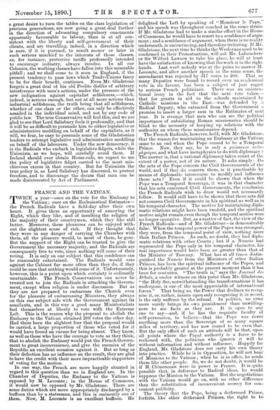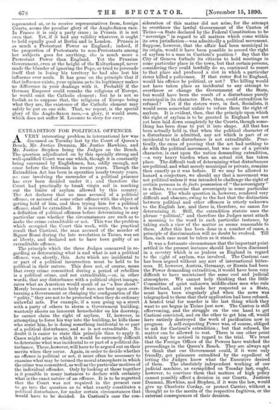FRANCE AND THE VATICAN. T WICE a year—once on the vote
for the Embassy to the Vatican ; once on the Ecclesiastical Estimates— the French Radicals have a field-day after their own heart. It gives them an opportunity of annoying the Right, which they like, and of insulting the religion of the majority of their countrymen, which they like still better. Moreover, these pleasures can be enjoyed with- out the slightest sense of risk. If they thought that they were in any danger of carrying the Chamber with them, all the pleasure would, to most of them, be gone. But the support of the Right can be trusted to give the Government the necessary majority, and the Radicals are consequently free to vote, since nothing will come of their voting. It is only on one subject that this confidence can be reasonably entertained. The Radicals would vote against the Cabinet far more often than they do, if they could be sure that nothing would come of it. Unfortunately, however, this is a point upon which certainty is ordinarily unattainable. The French Conservatives can never be trusted not to join the Radicals in attacking the Govern- ment, except when religion is under discussion. But as they are not prepared to embarrass the Church even for the pleasure of embarrassing Ministers, they always on this one subject side with the Government against its assailants, and in this way a good many Ministerialists feel themselves at liberty to vote with the Extreme Left. This is the reason why the proposal to abolish the Embassy to the Vatican obtained 208 votes the other day. Had there been the slightest fear that the proposal would be carried, a large proportion of those who voted for it would have found an excuse for being absent. They know, as well as those who have the courage to vote as they think, that to abolish the Embassy would put the French Govern- ment to great inconvenience, and give the enemies of the Republic an excellent occasion against it. But so long as their defection has no influence on the result, they are glad to have the credit with their more impracticable supporters of voting for the motion. In one way, the French are more happily situated in regard to this question than we in England are. In the Chamber of Deputies, the Embassy to the Vatican is opposed by M. Lecomte ; in the House of Commons, it would now be opposed by Mr. Gladstone. There are some duties which.are more appropriately discharged by a buffoon than by a statesman, and this is eminently one of .them. Now, M. Lecomte is an excellent buffoon. He delighted the Left by speaking of " Monsieur le Pape," and his speech was throughout couched in the same strain. If Mr. Gladstone had to make a similar effort in the House of Commons, he would have to resort to a semblance of argu- ment; and a semblance of argument, when there is no reality underneath, is unconvincing, and therefore irritating. If Mr. Gladstone, the next time he thinks the Weslevans need to be confirmed in their Protestantism, will ask Mr. Labouchere or Sir Wilfrid Lawson to take his place, he will at least have the satisfaction of knowing that the work is in the right hands. Last week nobody was at the pains to answer M. Lecomte, and after another speech in the same sense, the amendment was rejected by 317 votes to 208. That so many Deputies were found to record even an academical vote in its favour, has been a subject of just regret to serious French politicians. There was an uninten- tional irony in the fact that the next vote taken— that for grants in aid to the schools maintained by Catholic missions in the East—was defended by a Radical Deputy, who extracted from the Government a promise to insert a larger sum in the Estimates of next year. It is strange that men who can see the political importance of subsidising Roman missionaries should be blind to the necessity of keeping up relations with the authority on whom these missionaries depend. The French Radicals, however, hold, with Mr. Gladstone, that the reason for maintaining an Embassy at the Vatican came to an end when the Pope ceased to be a Temporal Prince. Now, they say, he is only a puissance meta- physique, and what have metaphysics to do with diplomacy :- The answer is, that a rational diplomacy takes count of the extent of a power, not of its nature. It asks simply : Do the acts of the Pope concern the Civil Governments of the world, and if they do concern them, is it practicable by means of diplomatic intercourse to modify and influence those acts ? Even if it could be shown that when the Pope was a Temporal Sovereign, it was in that character that his acts concerned Civil Governments, the conclusion the French Radicals wish to draw would not necessarily follow. It would still have to be shown that these acts did not concern Civil Governments in his spiritual as well as in his temporal character. The motive for maintaining diplo- matic relations might have been twofold, and the spiritual motive might remain even though the temporal motive were no longer operative. But, as a matter of fact, the view of the French Radicals—and of Mr. Gladstone—is demonstrably false. When the temporal power of the Popes was strongest, they were, from the temporal point of view, nothing more than Italian Princes. As such, no doubt, they had diplo- matic relations with other Courts ; but if a Nuncio had represented the Pope only in his temporal character, his real importance would have been no greater than that of the Minister of Tuscany. What has at all times distin- guished the Nuncio from the Ministers of other Italian Princes, has been the spiritual influence of the Popes, and this is probably greater at the present moment than it has been for centuries. " The truth is," says the Journal des Debate, a cooler witness on this point than Mr. Gladstone, " the Holy See, notwithstanding the transformations it has undergone, is one of the most appreciable of international forces." That being so, the Power that declines to recog- nise it, or, rather, insists upon only recognising it in secret, is the only sufferer by the refusal. In politics, no error more surely brings its own punishment than unwilling- ness to see facts as they are. It is open to any one to say—and, if he has the requisite faculty of self-persuasion, to believe—that the Pope was never anything more than the Sovereign of so many square miles of territory, and has now ceased to be even that. But the only effect of such an attitude will be that, upon all points where the Papal authority is a force to be reckoned with, the politician who ignores it will be without information and without influence. Happily for England, Mr. Gladstone does not carry his own theory into practice. While he is in Opposition, he will not hear of Missions to the Vatican ; when he is in office, he sends them like other people. So, we do not doubt, it would be if M. CMmenceau were in power in France. It is quite possible that, in deference to Radical ideas, he would suppress the Mission to the Vatican. But the negotiations with the Vatican would go on, with no other difference than the substitution of inconvenient secrecy for con- venient publicity. The theory that the Pope, being a dethroned Prince, forfeits, like other dethroned Princes, the right to be represented at, or to receive representatives from, foreign Courts, seems the peculiar glory of the Anglo-Saxon race. In France it is only a party craze ; in Prussia it is not even that. Yet, if it had any validity whatever, it ought to hold equally good at Berlin and in London. Prussia is as much a Protestant Power as England ; indeed, if the proportion of Protestants to non-Protestants among her subjects goes for anything, she is much more a Protestant Power than England. Yet the Prussian Government, even at the height of the Kulturkampf, never made the blunder of ignoring the Pope, or tried to persuade itself that in losing his territory he had also lost his influence over souls. It has gone on the principle that if that influence exists, your opinion as to its legitimacy makes no difference in your dealings with it. Probably if the German Emperor could remake the religions of Europe, he would omit the Catholic element; but he is not so foolish as to suppose that, the religions of Europe being what they are, the existence of the Catholic element may safely be put on one side. That, we repeat, is the special glory of the Anglo-Saxon race,—a glory, it would seem, which does not suffer M. Lecomte to sleep for envy.



















































 Previous page
Previous page